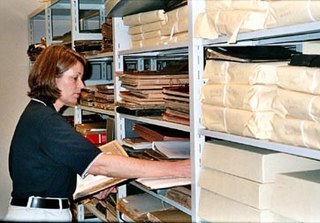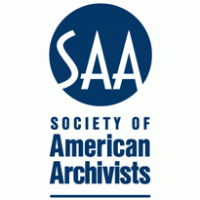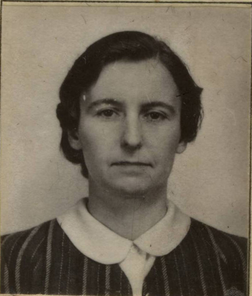Related Research Articles

The Historical Records Survey (HRS) was a project of the Works Progress Administration New Deal program in the United States. Originally part of the Federal Writers' Project, it was devoted to surveying and indexing historically significant records in state, county and local archives. The official mission statement was the "discovery, preservation, and listing of basic materials for research in the history of the United States". The creation of the Historical Records Survey was one of the signal events "in what Solon Buck called the 'archival awakening' of the 1930s".

An archivist is an information professional who assesses, collects, organizes, preserves, maintains control over, and provides access to records and archives determined to have long-term value. The records maintained by an archivist can consist of a variety of forms, including letters, diaries, logs, other personal documents, government documents, sound and/or picture recordings, digital files, or other physical objects.

The Society of American Archivists is the oldest and largest archivist association in North America, serving the educational and informational needs of more than 5,000 individual archivist and institutional members. Established in 1936, the organization serves upwards of 6,200 individual and member institutions.

Archival science, or archival studies, is the study and theory of building and curating archives, which are collections of documents, recordings, photographs and various other materials in physical or digital formats.
The American Archivist is a biannual peer-reviewed academic journal and the official publication of the Society of American Archivists. It covers theoretical and practical developments in archival science, particularly in North America. The journal contains essays, case studies, perspectives, and reviews of recent books and web resources. Contents are freely available to the public, except for the six most recent issues, which are viewable only to subscribers and society members. Online supplements are published irregularly and without access restrictions. Authors retain copyright of their work and license publication to the journal; the content is licensed under a Creative Commons Attribution Non-Commercial 3.0 United States License, except where otherwise noted.

Sir Charles Hilary Jenkinson was a British archivist and archival theorist, regarded as the figure most responsible for bringing continental European concepts of archival theory to the English-speaking world.
Original order is a concept in archival theory that a group of records should be maintained in the same order as they were placed by the record's creator. Along with provenance, original order is a core tenet of the archival concept of respect des fonds. A primary goal of keeping records in their original order is to preserve additional contextual information about the records' creator and the environment of their creation. Original order also encourages the archivist to remain neutral as opposed to applying any interpretation to the records.
"More Product, Less Process: Revamping Traditional Archival Processing" is a 2005 archival science article written by Mark A. Greene and Dennis Meissner that first appeared in the Fall/Winter 2005 issue of The American Archivist. The paper argues that traditional archival processing is too slow, and advocates for the use of minimal processing in order to reduce backlogs and provide access to archival collections as quickly as possible. The ideology presented in the article, abbreviated as MPLP, has since been widely adopted in modern archival theory with subsequent praise directed primarily towards the ability to increase user accessibility without prohibiting the option for future processing.

Lester Jesse Cappon was an American historian and documentary editor, and served as archivist for Colonial Williamsburg, Inc.

Elizabeth "Betty" Edwards Hamer Kegan was an American archivist and librarian, and served as the Assistant Librarian of Congress from 1963 to 1978. She was a founding member of the Society of American Archivists (SAA) in 1936 and was President of SAA from 1975-1976.

Elizabeth Belle Drewry was an American archivist, recognized for her long career at the National Archives and the Franklin D. Roosevelt Presidential Library and Museum. The first woman to become the head of a Presidential library, she was an expert in American World War I history and published Historical Units of the First World War (1942). In 1965, she received a Federal Women's Award, presented personally by President Lyndon B. Johnson for her work at the National Archives.

Harold Thomas Pinkett was an African-American archivist and historian. In 1942, he became the first African-American archivist employed at the National Archives of the United States. He was also the first African-American to become a fellow of the Society of American Archivists and to be editor of the journal The American Archivist. He was an expert in agricultural archives, and served as president of the Agricultural History Society.
Danna C. Bell is an archivist and librarian at the Library of Congress. Bell served as president of the Society of American Archivists from 2013 to 2014 and serves on the Advisory Committee on the Records of Congress. Bell has been invited to many national and international events and conferences on archives and special collections, including the ARL/SAA Mosaic Program Leadership Forum in 2016. She is active in the archives profession and writes and speaks on the importance of archival work.
Sue E. Holbert was an American archivist with the Minnesota Historical Society and the Minnesota State Archivist (1979–1993). She is now the owner of Booklady Used and Rare Books in Chicago, Illinois.
Gregor Trinkaus-Randall (1946-2019) was an American archivist and preservationist who served as the 67th President of the Society of American Archivists (SAA). He was also known as a leader in the library and archives preservation community in Massachusetts.
Susan Tucker is an American archivist. She was the Curator of Books and Records for the Newcomb Archives and Vorhoff Library at Newcomb College of Tulane University for over 30 years. She retired in 2015. She is a longtime member of the Society of American Archivists and is active in the Women's Collection Roundtable. She is now an archival consultant specializing in genealogy and family records.

David B. Gracy II was an American archivist and archival educator. He developed the Southern Labour Archives, was a founding member of the Society of Georgia Archivists, and authored the first American manual on arrangement and description for the Society of American Archivists. He was an early leader in archival education and professional certification for archivists and has advocated for archivists to promote societal understanding of archives and in particular the archival profession throughout his career. He also contributed significantly to the preservation and celebration of Texas history.
Michelle Caswell is an American archivist and academic known for her work regarding community archives and approaches to archival practice rooted in anti-racism and anti-oppression. She is an associate professor of archival studies in the Department of Information Studies at University of California, Los Angeles and is the director of the school's Community Archives Lab.
Marika Cifor is an American archivist and feminist academic known for her work in archival science, library science, and digital studies. Her research focuses on community archives, HIV/AIDS, affect theory, and approaches to archival practice rooted in social justice. She is an assistant professor at the University of Washington Information School. She also holds an adjunct faculty appointment in UW's Gender, Women and Sexuality Studies department.
The Council of State Archivists (CoSA) is a non-profit membership association of the United States state and territorial government archives.
References
- ↑ Linn, Mott (2015). "Not Waiting for Godot: The History of the Academy of Certified Archivists and the Professionalization of the Archival Field". The American Archivist. 78 (1). Society of American Archivists: 99–115. doi: 10.17723/0360-9081.78.1.96 .
- ↑ Blalack, Kate (July 25, 2016). "Record Number of Exam Applicants for 2016!" . Retrieved 4 August 2016.
- ↑ "ACA Online Membership Directory" . Retrieved 4 August 2016.
- ↑ "About Us" . Retrieved 4 August 2016.
- ↑ "Certification Maintenance" . Retrieved 4 August 2016.
- ↑ "Role Delineation Statement" . Retrieved 4 August 2016.
- ↑ Linn, Mott (2015). "Not Waiting for Godot: The History of the Academy of Certified Archivists and the Professionalization of the Archival Field". The American Archivist. 78 (1). Society of American Archivists: 102. doi: 10.17723/0360-9081.78.1.96 .
- ↑ Hamburger, Susan (June 2014). "Archival Certification – Necessity or Nicety?". Society of American Archivists. Archived from the original on 14 December 2017. Retrieved 4 August 2016.
{{cite journal}}: Cite journal requires|journal=(help) - ↑ Tansey, Eira (2015). "The landscape of archival employment: A study of professional archivist job advertisements, 2006-2014". Archival Practice. 2. Retrieved 4 August 2016.
- ↑ Linn, Mott (2015). "Not Waiting for Godot: The History of the Academy of Certified Archivists and the Professionalization of the Archival Field". The American Archivist. 78 (1). Society of American Archivists: 115. doi: 10.17723/0360-9081.78.1.96 .